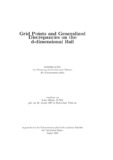Citation link:
https://nbn-resolving.org/urn:nbn:de:hbz:467-13733Files in This Item:
| File | Description | Size | Format | |
|---|---|---|---|---|
| Dissertation_Amna_Ishtiaq.pdf | 1.44 MB | Adobe PDF |  View/Open |
| Dokument Type: | Doctoral Thesis | metadata.dc.title: | Grid points and generalized discrepancies on the d-dimensional ball | Authors: | Ishtiaq, Amna | Institute: | Fakultät IV - Naturwissenschaftlich-Technische Fakultät | Free keywords: | Inverse problems (Differential equations), Discrepancy method, Quadrature points, Sphere | Dewey Decimal Classification: | 510 Mathematik | GHBS-Clases: | TBU TIL TLO |
Issue Date: | 2018 | Publish Date: | 2018 | Abstract: | The problem of distributing points on a domain, like ball, plays a special role in the fields like geosciences and medical imaging. Therefore, we present an equidistribution theory with a focus on obtaining low-discrepancy point grids on a 3-dimensional ball. The connection of the discrepancy method and the quadrature points on a given domain is quite well known. We approximate the integral of a function given on a bounded domain by the sum of function values at a specific set of points together with some weights. The idea is to get the best approximation with the fewest possible function values. The ansatz is logical, if the chosen data set is well distributed on the whole domain. This perspective, with the ball as a domain, enables us to get nice configurations as well as suitable approximations to the integrals of functions on the ball. It is, for instance, important for choosing the centres of the radial basis functions as they are needed for regularization methods such as the RFMP algorithm and the ROFMP algorithm, developed by the Geomathematics Group at the University of Siegen for ill-posed inverse problems with particular focus on the sphere and the ball as domains of the unknown functions. Additionally, it is also important for computational purposes. For instance, for the wavelet methods with data given on the ball, where one needs to have an appropriate quadrature rule. Das Problem, Punkte auf einem Bereich, wie einer Kugel, zu verteilen, spielt eine wichtige Rolle in den Geowissenschaften und der medizinischen Bildgebung. Deshalb präsentieren wir eine Gleichverteilungstheorie auf der 3DKugel in Bezug auf Minimum-Diskrepanz-Gitter. Der Zusammenhang zwischen Diskrepanz und Punktgittern für gegebene Bereiche ist wohlbekannt. Hierbei wird das Integral einer Funktion durch eine gewichtete Summe von Funktionswerten approximiert. Die Idee besteht darin, die beste Annäherung mit möglichst wenigen Funktionswerten zu erzielen. Der Ansatz ist klar, wenn die gewählten Punkte in dem gesamten Bereich gut verteilt sind. Diese Perspektive, mit dem Ball als Bereich, ermöglicht es uns, "schöne" Strukturen sowie geeignete Näherungen an die Integrale von Funktionen auf der Kugel zu erhalten. Zum Beispiel ist es wichtig, die Mittelpunkte der radialen Basisfunktionen auszuwählen, weil diese für Regularisierungsmethoden wie den RFMP-Algorithmus und den ROFMP-Algorithmus benötigt werden. Diese Algorithmen wurden von der AG Geomathematik der Universität Siegen für schlecht gestellte inverse Probleme mit besonderem Fokus auf die Sphäre und die Kugel als Definitionsbereiche entwickelt. Darüber hinaus sind solche Gitter auch für andere numerische Zwecke hilfreich, wie z.B. für Wavelet-Verfahren auf der Kugel, die ein Quadraturgitter brauchen. |
URN: | urn:nbn:de:hbz:467-13733 | URI: | https://dspace.ub.uni-siegen.de/handle/ubsi/1373 | License: | https://dspace.ub.uni-siegen.de/static/license.txt |
| Appears in Collections: | Hochschulschriften |
This item is protected by original copyright |
Page view(s)
732
checked on Nov 25, 2024
Download(s)
295
checked on Nov 25, 2024
Google ScholarTM
Check
Items in DSpace are protected by copyright, with all rights reserved, unless otherwise indicated.

